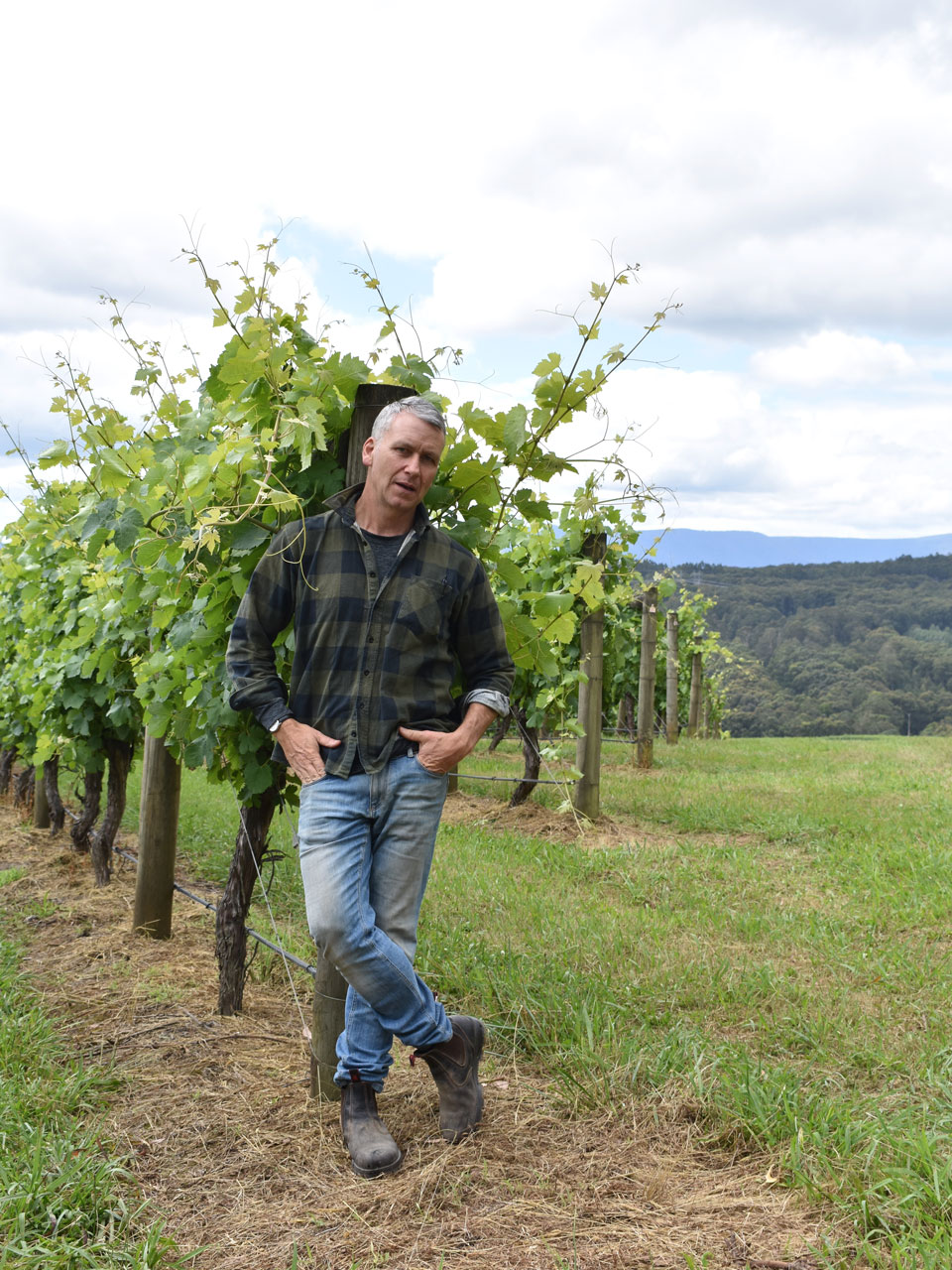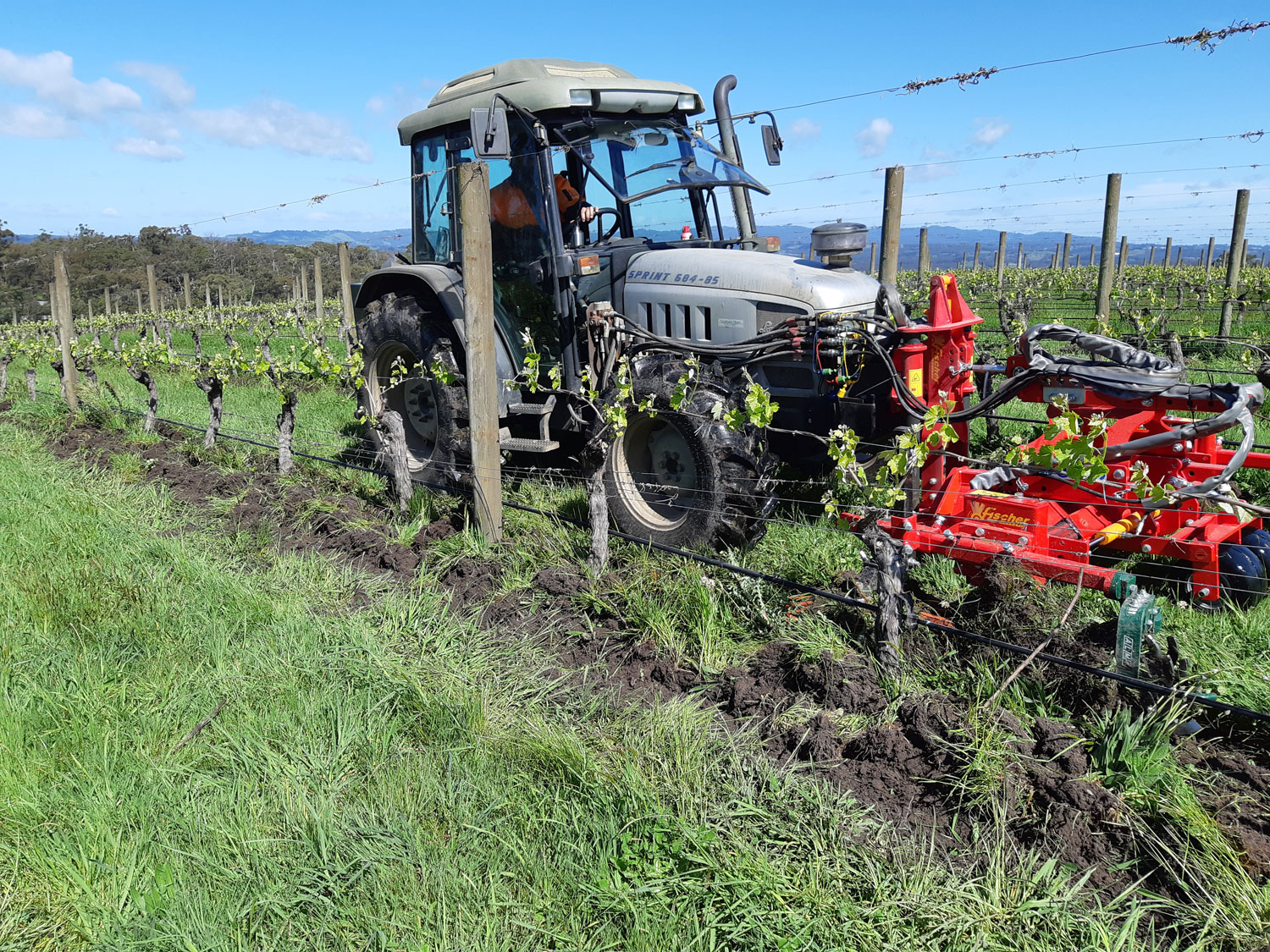Greg Kerr’s Solitude Estate may not be a familiar name to many, but its former moniker, Tibooburra Vineyard, will likely ring bells for Yarra Valley enthusiasts. The fruit from the Upper Yarra site is made into wine under Kerr’s estate label but it has also notably contributed to the wines of some of the Yarra’s leading small makers: Gary Mills (Jamsheed), Andrew Marks (The Wanderer), Luke Lambert (Lambert) and Jayden Ong (One Block). While chardonnay and pinot noir are the key varieties, a ’90s roll of the dice on shiraz has also seen the grape star on the 29-hectare vineyard.
Greg Kerr’s parents, Laurie and Vivienne, bought their Yellingbo property in 1967, establishing a successful Black Angus stud on the 1,000-hectare holding. They also, somewhat far-sightedly, began a program of implementing conservation reserves across the property in the ’80s. The first vines were planted in 1996, with additions made in ’97, ’99, 2001, ’05, ’12 and ’20. That last planting was on rootstock, a sign of the recent threat that phylloxera is posing to the Yarra Valley, but the prior ones have all been on own roots. Across the 29 hectares of vines, chardonnay and pinot noir are predictably the dominant varieties, but Kerr also has 3 hectares of sauvignon blanc and 6 hectares of shiraz.
“Being located in the Upper Yarra, the estate is renowned for pinot noir and chardonnay,” Kerr says, “so when we began planting shiraz in the late 90s, we were told we were crazy – it would never ripen. Back then, we took an educated gamble that it would not only ripen well, but it would provide us with a genuine point of difference. Two sites were chosen: one an exposed north-west ridge overlooking the Great Divide; the other on a south-westerly aspect facing the Dandenongs.”
That gamble certainly paid off, with the shiraz fruit finding its way into a Yering Station single site wine, along with Luke Lambert’s signature syrah for several years, and bottlings from Jamsheed and Jayden Ong’s One Block. “Typically, Solitude shiraz fruit produces a refined linear style of wine, generous in perfume with some Northern Rhône hallmarks, including spice, mocha and black raspberry,” says Kerr. Mills also uses chardonnay from the site as well as pinot noir, which Andrew Marks also employs for his The Wanderer label (the side gig to his family’s estate, Gembrook Hill). Marks also makes the Solitude Estate wines for Kerr.
“Andrew plays a crucial role in the styling of our label,” says Kerr. “He is a very conscientious operator and has helped me understand the importance of timing in the vineyard. We are constantly in discussion about harvesting fruit at the ‘sweet spot’, when sugars and acids are in balance, and grapes are physiologically ripe. Ultimately, we want to produce wines that express the vineyard, and that complement the food on the table.”
Kerr doesn’t farm by any particular doctrine, employing many organic practices and avoiding “remedial solutions”, though minimal herbicides and fungicides are used when necessary. An integrated pest management program is ably supported by the work begun by Kerr’s parents, with the well-established nature reserves not just significantly beautifying the property but also preserving natural waterways and encouraging beneficial insect populations. Kerr has also enhanced this by planting thousands of native trees and shrubs around the vines, and he notes that light brown apple moth – a significant contributor to crop loss in cooler regions ¬– is now no longer much of a problem. Those plantings have also increased the populations of hawks and eagles, which help deter introduced species that cause crop damage.
“I like to try to keep things simple, to work with nature and the four seasons,” says Kerr. “One of the best weapons you have as a viticulturalist is to recognise the natural assets of your property, to work carefully with that template, and to be patient. It certainly pays to think in three-to-five-year arches, as it can take that long for certain improvements to reap dividends.”
Over the last five years, Kerr has added an under-vine cultivator and rehabilitator plough to his equipment shed, which he says have reduced soil compaction and helped aerate the soils, in turn creating better nutrient cycling with the improvement showing in the fruit. “Vines have a way of showing you whether they are happy or not,” Kerr says. “The South African writer Laurens van der Post described animals as the ‘eyes of God’ and plants as the ‘thoughts of God’. As an extension of that idea, I believe that if you farm responsibly and in a sustainable fashion, you will generally be rewarded with good crops.”
One of the biggest challenges at Solitude is finding skilled hands to manage the vineyard. “Being at the premium end of the grape supply market, there is an emphasis on attention to detail,” says Kerr. “Pruning, canopy management, hand harvesting … it all requires the help of people willing to get out among the vines, to share the load. It really helps if the labour force enjoys working with plants; better still, if they recognise that we are ultimately striving to deliver a special product.”
A more reliable labour force is planned for the near future, with Kerr planning to introduce sheep, or more specifically, Wiltipolls – a breed developed in Australian that sheds its wool annually and is not prone to fly strike, making them an adapted, low-maintenance breed ideal for meat production. “I believe the sheep will help keep weeds and grasses under control, add nutrients back into the soil, and will possibly enable us to generate an alternate source of income,” he says.
No synthetic fertilisers are used on the vineyard, instead natural measures are employed, such as processed chook manure and seaweed-based products, along with fulvic acid and fish and kelp extracts. “The soil should have plenty of worms, and it should smell ‘alive’; canopies should be vibrant green and robust,” says Kerr. “If the vines and the soils are in balance, then you are well on the way to a good harvest and ultimately good wines.”
Kerr is very conscious of the fact that he is simply today’s custodian of their land, as are all farmers, actively encouraging young family members and students to participate in the operation. “Some of us may have 20 or 30 years to make a go of it, then it will be someone else’s turn,” he says. “Clearly, we all want to make a go of it, earn a living and maybe even recognition that we’ve done something special. But ultimately, our key responsibility is to leave the land in better shape than we found it, and to build enduring stories and good social cultures around our endeavours.”
It’s no secret that all wine regions are warmer than they used to be, but the location of Solitude Estate is an advantage though some amelioration is still needed. “Being in close proximity to alpine regions means we have a natural buffer against extremes in heat,” says Kerr, “so we aim to generate strong canopies partly by using natural tonics, including kelp and fish-based sprays. Another method is to minimise trimming where row orientation means vines are vulnerable to the sun. This means our crops can generally stay on the vine longer… Our grapes usually retain good acidity and delicate flavours even in the extremely hot years, which is a bonus in the winery.”
The proximity to the foothills of the Upper Yarra provides distinct weather patterns that work in concert with the distinctive geology to create fruit, and wine, reflective of place. “Soils include Silvan red to deep black volcanic seams,” says Kerr, “and we are influenced by a variety of weather streams including alpine patterns from the east, warmer ‘prairie’ winds from the north-west, even the occasional maritime cool change from the south-west. All these influences create an interesting and unique terroir – and an ideal template for our grapes and resultant wines.”




